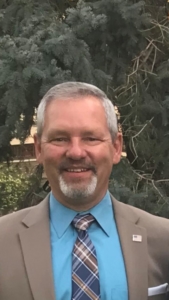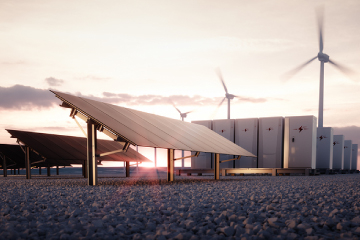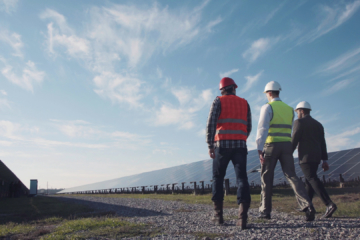- Why EDF power solutions?
- About UsAbout UsWe’re committed to providing future generations with the means to power their lives in the most economic, environmental and socially responsible ways possible.
- What We DoWhat We DoWe are a market-leading, independent power producer and service provider, delivering: wind (onshore and offshore), solar photovoltaic, storage, and electrical vehicle charging.
- Landowners
- Suppliers
- Projects
- Careers
- News
- Contact
New “Extreme Cold Weather” Rules Are Coming. Are You Ready?

Q&A with NERC Business Development Manager Todd Chwialkowski
When Winter Storms Uri and Viola hit North America in February 2021, they exposed several weaknesses in our nation’s electrical system to withstand extreme cold weather events. In response, the North American Electric Reliability Corporation (NERC) has fast-tracked new requirements for generator owners (GO) and generator operators (GOP) to address these shortcomings. A revised Standard (EOP-011-2) will become effective in April, 2023, requiring GOs and GOPs to implement Cold Weather Preparedness Plans for its generating units, and it is expected that the Federal Energy Regulatory Commission (FERC) could soon issue new rules that will have wide-reaching implications for all owners/operators of electric generation facilities. EDF Renewables’ NERC Business Development Manager Todd Chwialkowski walks us through the proposed rules and how companies can prepare.
What are the new requirements, who will be impacted, and when?
There are actually two sets of standards being modified/developed – both fall under NERC’s Project 2021-07 Extreme Cold Weather Grid Operations, Preparedness, and Coordination, but the one we’re focused on right now is “EOP-012-1 – Extreme Cold Weather Preparedness and Operations.” Most people refer to it as simply “EOP twelve.”
These new rules will be sweeping in scope and will impact all bulk electric system (BES) generators – basically, all utility-scale generation facilities, regardless of generation type – across NERC’s entire footprint. We expect NERC to finalize the rules this fall and anticipate they could be approved by FERC in late 2022 or early 2023.
What will the new standards require?
The specifics are still being worked out, but in a nutshell, generator owners and generator operators (GOs/GOPs) will have to use an algorithm to determine the coldest temperature that occurred at a given facility since January 1, 2000 – referred to as the extreme cold weather temperature – and then affirm to NERC that the facility will be able to generate power if that extreme cold weather temperature occurs again.
If generating units already in commercial operation cannot operate under that extreme cold weather temperature, whether due to technical, commercial or operational constraints, then the GO/GOP must provide evidence documenting the generating unit’s operating limitations, which may include capability/availability, fuel supply and inventory concerns, or environmental constraints. A generating unit’s minimum temperature could be constrained by the design temperature, historical operating temperature, or the current cold weather performance temperature, as determined by an engineering analysis.
By gathering this type of information for all generation on the system, NERC and the BES operators and planners will have a clearer picture of available generation during extreme environmental conditions, which will enable them to better manage load during extreme cold snaps.
What does that mean in practical terms? What will generator owners / operators have to do?
Complying with these new requirements will require significant investments of time and money.
The required activities can be categorized into three phases:
- Understanding the specific compliance, documentation and reporting requirements for each facility.
- Systematically analyzing each generation facility and ascertaining the manufacturer specifications for all components to get a holistic picture of the facility’s operating parameters. For newly constructed facilities, this assessment will be a daunting task; for older facilities, tracking down the information may be even more challenging.
- Correctly and accurately reporting this information to NERC, and complying with future requirements to recertify the information, or to create (or modify) corrective actions plans in the event the facility fails to meet its stated parameters.
What if a generator owner / operator is unable to guarantee its ability to perform in extreme cold weather? Will they have to perform retrofits or decommission the facility?
It is our understanding that the new requirements are being developed to allow some flexibility, and that no facility will be decommissioned or required to undergo mandatory retrofits. For some facilities, the investment necessary to implement “freeze protection measures” may be completely uneconomic. If a facility is not able to implement measures due to technical, commercial or operational constraints, the GO/GOP will have the ability to develop evidence to that effect, and state they cannot meet the new requirements to generate power during periods of extreme cold weather temperatures. The GO/GOP would need to have evidence in place to prove the lowest operating temperature for their generating unit(s) and review this determination every five years (something that will incur its own set of costs).
The new requirements sound important but onerous. How has industry responded, and how has EDF Renewables been involved?
There is widespread recognition that while these new requirements will create a significant burden when first implemented, they are vital for the security and reliability of the bulk electricity system on which our lives and economy depend. Industry has worked closely with NERC throughout the process to develop rules that are necessarily tough but fair. EDF Renewables has played a leadership role in helping to shape the regulations for the renewables industry, in addition to commenting directly during the development process and participating in the balloting (approval) process for the standards, along with supporting the American Clean Power association’s regulatory committee with their collective industry feedback to NERC on the standards.
What is the anticipated timeline for all of this, and how can companies prepare?
The NERC Standards Development Team is actively working on modifying and developing rules and guidelines to meet FERC’s approval. Following FERC’s approval, the first requirements will become effective on the first day of the first calendar quarter, that is 18 months after FERC’s order approving the standards and requirements. As noted, the development and approval process for the requirements seem to be fast-tracked, but nevertheless must follow NERC’s Standards Development processes. An industry comment period is currently underway and will end on 9/1/2022. The industry balloting period begins on 8/23/2022 and will also end on 9/1/2022.
As we await finalization of the new requirements, GOs and GOPs should take a proactive approach to planning for the inevitable. EDF Renewables’ NERC Compliance Services group can help. Our experts leverage firsthand knowledge and extensive experience to provide industry-leading service.
Additional Resources
The February 2021 Cold Weather Grid Operations: Preliminary Findings and Recommendations, a joint report issued by FERC and NERC, summarizes the key impacts and causes of the outages.
The TexasRE presentation, Follow-up on Winter Storm Uri Report Recommendations, provides a summary of NERC’s 2021-07 project referenced above.
- © 2025 EDF power solutions North America North America
- Privacy Policy
- AB 1305 Disclosure
- TCFD Report
- EDF power solutions


